Wednesday, October 24th 2018
HighPoint Releases Bootable Quad M.2 NVMe RAID Card: the SSD7102
HighPoint has announced the release of a bootable Quad M.2 NVMe RAID card. The SSD7102 features a PCIe x16 connector for plugging into a users' system, and is essentially an expansion card that can house up to four M.2 NVMe SSDs - four 4x PCIe NVMe SSDs comes up to 16 total PCIe lanes, so the math definitely does check out. HighPoint has gone around CPU-bound limitations in recognizing this type of multiple devices folded into a single one with the usage of a PLX8747 PCIe bridge chip. Custom firmware allows these four drives in RAID to serve as a bootable device.RAID is supported in RAID 0 (all drives working in tandem for the best speed); RAID 1 (the drives are set in pairs for data mirroring), or single-drive boot in a JBOD configuration. When in this configuration, all of the drives can be a boot volume, which means multiple OS installs are possible. The SSD7102 features a shroud and a single 50 mm fan to help in cooling your selection of drives (it supports any kind of vendor drive, but of course that for RAID configurations it's best to pair identical drives). The card is supported under Windows 10, Server 2012 R2 (or later), Linux Kernel 3.3 (or later) and macOS 10.13 (or later). MTBF is set at just under 1M hours, with 8 W typical power consumption, and will be available at an MSRP of $399.
Source:
AnandTech
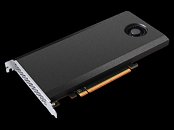
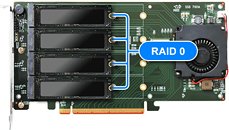
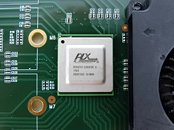
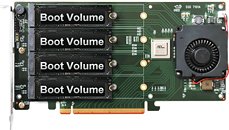
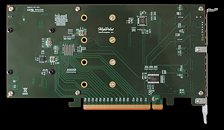
23 Comments on HighPoint Releases Bootable Quad M.2 NVMe RAID Card: the SSD7102
time to call up the ole banker person with the gold cards :D
Nom nom the speed you can get with this, now my old Samsung 950 pro sundenly feels so slow:rolleyes:
And I agree about the fan, it does seem kinda wimpy, but seeings how it is practically on top of the plx chip, me thinks it was intended to keep it somewhat cool first before blowin on over to the drive section...
It IS fine people like me, who use their "home" computers for more than just web browsing, email, gaming, and pron watching.... like maybe some computational analysis, sound/video production, cad/cam work, scientific research.... just to name a few :)
Things that can and will benefit from faster boot and load times, read/write times, and reduced access bottlenecks....you know, like, all that stuff that makes using a computer efficient and productive AND pleasant too....
These will shine for large sequential file transfers, but probably won't be any better than a single drive for most other work.
Does anyone know if this is still the case for this type card?
If not then whatever gains made from the raid setup might be marginal, at best....
The problem is that there isn't a ton of useful documentation on this chip, the best I can find so far is here;
www.broadcom.com/products/pcie-switches-bridges/pcie-switches/pex8747#overview